
Marilyn Gamm is the 2014–2016 Chair of the Presbyterian Mission Agency Board
Email Marilyn
May 2016
Pentecost
In the last days it will be, God declares, that I will pour out my Spirit upon all flesh, and your sons and your daughters shall prophesy, and your young men shall see visions, and your old men shall dream dreams.–Acts of the Apostles 2:17
 The Christian Day of Pentecost is a day for dreaming—a day for Holy Spirit-inspired dreaming about what might be, a day for openness to exploring the new possibilities God is placing before us. And through his quoting the prophet Joel in his Pentecost sermon Peter teaches us that Pentecost is a day to recognize the God-given gifts, inspiration and witness of the young people in our midst. The Day of Pentecost teaches us that young people are not only the church’s future; young people are indeed the church’s present. The visions and dreams God gives to our youth and young adults are as equally valid as those given to our senior adults. Indeed, a message of Pentecost is that serving Christ is to be a multigenerational endeavor.
The Christian Day of Pentecost is a day for dreaming—a day for Holy Spirit-inspired dreaming about what might be, a day for openness to exploring the new possibilities God is placing before us. And through his quoting the prophet Joel in his Pentecost sermon Peter teaches us that Pentecost is a day to recognize the God-given gifts, inspiration and witness of the young people in our midst. The Day of Pentecost teaches us that young people are not only the church’s future; young people are indeed the church’s present. The visions and dreams God gives to our youth and young adults are as equally valid as those given to our senior adults. Indeed, a message of Pentecost is that serving Christ is to be a multigenerational endeavor.
It is for this reason that the Pentecost Offering, one of the four special offerings of the Presbyterian Church (U.S.A.), was established to benefit Young Adult Volunteers, Ministries for Youth and Children at Risk.
Forty percent of the Pentecost Offering may be retained by individual congregations for their own use in supporting local children’s, youth and young adult ministries. The ways individual congregations are putting their portion of the Pentecost Offering to work include providing hot meals for at-risk children in their community, providing resources to support grandparents raising their grandchildren, collecting school supplies, providing resources and supplies to domestic abuse shelters that house children and youth, collecting clothing for children and youth and providing resources related to teen pregnancy.
The Presbyterian Mission Agency distributes 25 percent of the Pentecost Offering to support ministries for youth, including travel support assisting presbyteries in sending young people to the Presbyterian Youth Triennium, which will take place July 19-23. Another 25 percent of the offering helps support the Young Adult Volunteer program, through which young adults serve a year at one of more than 20 mission sites around the country and around the globe. And 10 percent of the Pentecost Offering supports the national “Educate a Child, Transform the World” endeavor, part of a global initiative to better the lives of one million children by 2020.
Although the co-missional Pentecost Offering may be received at any time, congregations are particularly encouraged to receive the offering on the Day of Pentecost, which this year is on May 15. Please give as you are able to support the dreams and visions of our children, youth and young adults.
April 2016
Farmers
[Jesus] also said, “The kingdom of God is as if someone would scatter seed on the ground, and would sleep and rise night and day, and the seed would sprout and grow, he does not know how.—Mark 4:26–27
One April morning about 20 years ago—early in my pastoral ministry—a 70-something wheat farmer in my congregation came into my office, stating that he had a question for me. For the first time in his 50 years of farming he had decided to plant corn that spring. It had been a couple of weeks, but no shoots of corn had so far emerged from the soil. Knowing that I had grown up on a Missouri farm that grew corn among its crops, he asked whether he should wait a bit or plow and replant his corn. Because I knew the soil temperature was not yet warm enough to sprout corn, I encouraged him to wait at least a couple of weeks and see what happened. About two weeks later he was back in my office, grinning from ear to ear. Corn plants were emerging from the soil.
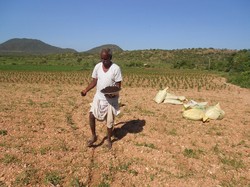 I grew up hearing that farmers are gamblers. The farmer gambles that the seeds planted will sprout. The farmer then gambles that the plants will receive the right amounts of rain and sun to grow and produce a plentiful harvest of grain, fruit or vegetables. The farmer gambles that there will be good weather in which to harvest the produce that has been grown. The farmer gambles that the food grown will not spoil before it reaches those who will consume it. And finally, the farmer gambles that a good price will be paid for the produce that is sold.
I grew up hearing that farmers are gamblers. The farmer gambles that the seeds planted will sprout. The farmer then gambles that the plants will receive the right amounts of rain and sun to grow and produce a plentiful harvest of grain, fruit or vegetables. The farmer gambles that there will be good weather in which to harvest the produce that has been grown. The farmer gambles that the food grown will not spoil before it reaches those who will consume it. And finally, the farmer gambles that a good price will be paid for the produce that is sold.
This year the Presbyterian Church is observing International Day of Farmers’ Struggles on April 17. In our ever-more-urbanized and suburbanized American culture this is a day to learn more about the challenges faced by farmers not only in the United States, but also and especially around the globe. According to the Joining Hands Network of the Presbyterian Hunger Program, “farmers are the ones who feed the planet, but surprisingly, they are also amongst the poorest and hungriest people in the world.”
I invite you to co-missionally join with me in learning more about farmers’ struggles and how you can support and advocate in their behalf using the following resources:
- Read more and download A Preliminary Report on Seeds & Seed Practices across the United States produced by the US Food Sovereignty Alliance, the Presbyterian Hunger Program and partner organizations.
- Actions to Take for Seed Freedom
- The untold life of the 21st-century farmer by Andrew Kang Bartlett
- Reflection on Seeds by activist Laura Valencia
- Farmer Suicides in India by Vandana Shiva
- Seeds of Death
- Seeds of Freedom
- The World According to Monsanto
- The Jakarta Call- A new documentary from Via Campesina about seeds. See the trailer here.
March 2016
Self-Development
And Ruth the Moabite said to Naomi, “Let me go to the field and glean among the ears of grain, behind someone in whose sight I may find favor.” She said to her, “Go, my daughter.”—Ruth 2:2
Probably no more than a couple of years ago I was introduced to a new-to-me phrase: “food deserts.” As a Midwestern farmer’s daughter, I struggled a bit to wrap my mind around the “food desert” concept. Because we grew our own food not only for the table, but also for the freezer and the cellar, going hungry was never an issue. We might not have always had what we might have preferred to eat, but there was always plenty of healthy, wholesome food available. Hunger and starvation were serious problems that occurred in distant lands, but not here in the United States.
Of course, as an adult I’ve been aware that people not only go hungry, but even starve to death here in the United States, too. Through my introduction to “food deserts,” I have come to realize that there are places in our country, mostly urban areas, where there are actually barriers to people being able to access healthy food of any kind.
 The Presbyterian Mission Agency’s Self-Development of People program is a ministry that affirms God’s concern for humankind. A core concept is co-missionally empowering people to benefit from endeavors they own and control. The owning, planting, tending and harvesting from urban vegetable gardens established in a “food desert” is an example of self-development of people.
The Presbyterian Mission Agency’s Self-Development of People program is a ministry that affirms God’s concern for humankind. A core concept is co-missionally empowering people to benefit from endeavors they own and control. The owning, planting, tending and harvesting from urban vegetable gardens established in a “food desert” is an example of self-development of people.
Eight Self-Development of People projects totaling $97,650 have been funded to date this year:
- Somali Bantu Community Mutual Assistance Association of Lewiston/Auburn, Maine, $14,300 to assist this women’s group with its program.
- Damayan Cleaning cooperative, New York, New York, $15,000 for this worker-owned cooperative.
- Wayside Outreach and Development Inc., Brooklyn, New York, $4,000 to replace equipment and supplies lost or damaged during renovation; to provide training in arts, crafts and sewing to seniors to improve their quality of life.
- Equipping, Encouraging & Empowering Workers in Vredenburg, Alabama, $14,450 tohelp underemployed and unemployed local residents prepare for the workforce through test preparation and GED classes.
- VEGGI Farmers Cooperative, New Orleans, Louisiana, $15,000 for this multiethnic farmers cooperative growing vegetables to sell to the public as well as grocers in East New Orleans.
- Families & Criminal Justice, Los Angeles, California, $14,900 for this peer-to-peer support group that works with women who are incarcerated or recently released to improve their health.
- Radio Indigena (Indigenous Radio Station), Oxnard, California, $15,000 for this nonprofit community radio station that broadcasts in indigenous languages to serve the community in Ventura County.
- S
_small100.jpg) titching up Detroit, Michigan, $5,000 in technical assistance for a youth-run screen print and graphic design collective.
titching up Detroit, Michigan, $5,000 in technical assistance for a youth-run screen print and graphic design collective.
Self-Development of People Sunday is March 13. The program is one of the beneficiaries of the annual One Great Hour of Sharing Offering received during the Lenten and Easter season.
February 2016
Advocacy
Is not this the fast that I choose: to loose the bonds of injustice, to undo the thongs of the yoke, to let the oppressed go free, and to break every yoke? Is it not to share your bread with the hungry, and bring the homeless poor into your house; when you see the naked, to cover them, and not to hide yourself from your own kin? — Isaiah 58:6–7
 One of the hallmarks of the Reformed faith is our history of doing justice, our tradition of applying biblical and theological principles to issues that affect public life. In a story published by the Presbyterian News Service on January 15, Sara Lisherness, director of Compassion, Peace and Justice ministries, said of the Reformed tradition, “We’ve always understood that we care for the spiritual life of faith communities, but we are also called to care for the moral life of our communities, nation and world. We are called to work for justice and peace.”
One of the hallmarks of the Reformed faith is our history of doing justice, our tradition of applying biblical and theological principles to issues that affect public life. In a story published by the Presbyterian News Service on January 15, Sara Lisherness, director of Compassion, Peace and Justice ministries, said of the Reformed tradition, “We’ve always understood that we care for the spiritual life of faith communities, but we are also called to care for the moral life of our communities, nation and world. We are called to work for justice and peace.”
Guiding us in this call to co-missionally partner with God to advocate for another—for another’s real human needs—are such resources as the Presbyterian Mission Agency’s Office of Public Witness’s Holy Discontentment: Lifting Your Voice for Effective Advocacy, a resource that is particularly suggested for use in conjunction with Justice Advocacy Sunday, celebrated this year on February 28.
Another advocacy resource is the upcoming 2016 Compassion, Peace and Justice Advocacy Training Weekend. This year’s theme is “Lift Every Voice: Racism, Class, and Power.” The event will take place April 15–18 at New York Avenue Presbyterian Church in Washington, D.C. The Advocacy Training Weekend flyer states, “As Christians, God calls us to lift up all voices so that we the people might regain influence in the policies that affect our nation and our world.” Attendees will be encouraged to “lift up your voice for transparent and participatory government at home and abroad.” This year’s Advocacy Training Weekend will particularly focus on how “Presbyterians are working to address the suppression of political and economic rights of people of color, immigrants, workers, and the poor in our own country and abroad.” You can register online for the Advocacy Training Weekend by clicking here.
January 2016
Epiphany
In the time of King Herod, after Jesus was born in Bethlehem of Judea, magi from the East came to Jerusalem, asking, “Where is the child who has been born king of the Jews? For we observed his star at its rising, and have come to pay him homage.”—Matthew 2:1–2
 Oh, what a difference a month makes! I wrote my December Great Co-Mission column within days of the Paris terrorist attack and then on December 2 a terrorist attack killing 14 people and wounding 21 others occurred within my presbytery and just a few miles from my San Bernardino, California, office. Thank you, Presbyterian Disaster Assistance, for being present in our congregations the Sunday after the attack, and for the ways you are continuing to walk the shock, grief, and recovery journey with us.
Oh, what a difference a month makes! I wrote my December Great Co-Mission column within days of the Paris terrorist attack and then on December 2 a terrorist attack killing 14 people and wounding 21 others occurred within my presbytery and just a few miles from my San Bernardino, California, office. Thank you, Presbyterian Disaster Assistance, for being present in our congregations the Sunday after the attack, and for the ways you are continuing to walk the shock, grief, and recovery journey with us.
Our Savior, Jesus, the Christ, was born into a world in which real evil seemed to reign. The real evil recounted in the traditional Epiphany story from Matthew’s Gospel was named Herod the Great, a tyrant who ordered the murder of baby and toddler boys in his attempt to thwart God’s epiphany. Although what Herod did was horrible, his evil intention of thwarting God’s Messiah failed. Through Jesus, God revealed the full power of Divine LOVE, a love willing to walk among us, and ultimately to suffer and die for us to re-create us through resurrection, new life extended through the gift of Divine GRACE.
In our world today some of the names by which real evil is known are ISIS, Al Qaeda, and Hamas. Under their guise, horrible acts are being committed in our world, and it can feel as if evil is reigning supreme. One of the messages of this Epiphany season is that evil is real, but does not have ultimate power. God guided Jesus’ earthly parents to take him to Egypt to preserve his childhood life in preparation for his future adult ministry of teaching, healing, and ultimately of Divine RECONCILIATION with our Creator.
Earthly life is at times hard, painful, complicated. One of the messages of this Epiphany season is that the God made manifest in a peasant baby born in Bethlehem before whom foreign magi bowed and worshiped understands firsthand the reality of evil—understands and overcomes it in our behalf over and over again in ways we may not presently understand.
We are co-missional partners in God’s overcoming evil in this world—not for all time, but for a time within God’s time. Among the ways we may partner with God in overcoming evil in this world are through our advocacy ministries through our Office of Public Witness and our Presbyterian Ministry at the United Nations.
December 2015
Advent
For a child has been born for us, a son given to us; authority rests upon his shoulders; and he is named Wonderful Counselor, Mighty God, Everlasting Father, Prince of Peace. His authority shall grow continually, and there shall be endless peace for the throne of David and his kingdom. He will establish and uphold it with justice and with righteousness from this time onward and forevermore. The zeal of the Lord of hosts will do this.—Isaiah 9:6–7
As I am writing this month’s Great Co-Mission column the peace envisioned by Isaiah seems impossible to imagine. Paris and Beirut have each suffered devastating loss of human life at the hands of the ISIS terrorist organization. In retaliation, France has launched airstrikes against ISIS targets in Syria. A Russian jetliner has been brought down by an explosion, killing all 224 aboard. ISIS is claiming responsibility, likely in retaliation for Russian airstrikes in Syria. And the world waits to learn what, if anything, the United States will do.
Meanwhile, the number of Syrian refugees fleeing to Europe has created a humanitarian crisis as nations consider whether to offer asylum or to turn away from their borders those who seek shelter and peace from the horrors of their homeland. And the world waits to learn how many Syrian refugees the United States will welcome as well.
 Into this world of terrorist organizations with threats of global reach and destruction of human life, into this world of peoples seeking new homelands where they no longer need to live in daily fear, into this world this season we again hear the prophet Isaiah proclaiming the promised advent of a “Prince of Peace” whose “authority shall grow continually” and who will uphold peace “with justice and with righteousness from this time onward and forevermore.”
Into this world of terrorist organizations with threats of global reach and destruction of human life, into this world of peoples seeking new homelands where they no longer need to live in daily fear, into this world this season we again hear the prophet Isaiah proclaiming the promised advent of a “Prince of Peace” whose “authority shall grow continually” and who will uphold peace “with justice and with righteousness from this time onward and forevermore.”
Too often in our world, as in Isaiah’s world so long ago, such promises of peace may seem like a pipe dream, a fairy tale for children that says everything will be all right while the adults believe otherwise. But through Isaiah we are further promised that the “zeal of the Lord of hosts will do this.”
In the midst of horror and destruction and devastation, of broken dreams and a sense of futility that says evil is winning and will always win, comes a message of hope that begins with the birth of a Child. Not just any child, but the advent of one distinguished by such powerful and awe-inspiring titles as “Wonderful Counselor, Mighty God, Everlasting Father, Prince of Peace.”
The message of the Advent season leading us into the joy of Christmas is that none other than the God we worship and serve has entered our world as a child, a human baby born the way all of us are born, through pain suffered in anticipation of a hope-filled future. Like the painful advent of a baby being born, our faith in the Prince of Peace continues to call us to envision a hope-filled future for our world.
One of the ways we can co-missionally participate in leading people through pain and suffering to a hope-filled future is through supporting Presbyterian Disaster Assistance. Others include supporting the Presbyterian Peacemaking Program, the Christmas Joy Offering, and the Presbyterian Giving Catalog.
I close with an excerpt from the call to prayer issued by the Rev. Dr. Laurie Ann Kraus, Presbyterian Disaster Assistance coordinator for the Presbyterian Church (U.S.A.), on Friday, November 13, 2015, following the terror attacks in Paris:
“We ask for sustaining courage for those who are suffering; wisdom and diligence among global and national agencies and individuals assessing threat and directing relief efforts; and for our anger and sorrow to unite in service to the establishment of a reign of peace, where the lion and the lamb may dwell together, and terror will not hold sway over our common life. . . In the name of Christ, our healer and our Light, we pray. Amen.”
November 2015
Caregivers
The LORD upholds all who are falling, and raises up all who are bowed down.—Psalm 145:14
During this month especially set aside culturally in the United States for giving thanks, I’d like to give thanks for a very special group of people—caregivers. Although November 8, 2015, is designated as Caregiver Sunday on our Presbyterian Planning Calendar, we can give thanks for those who provide care to spouses, parents, special needs children and adults, and others any and every day of the year.
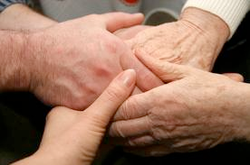 According to the Presbyterian Health Network, “More than 65 million people, 29% of the U.S. population, provide care for a chronically ill, disabled, or aged family member or friend during any given year. The responsibilities and challenges of caring for a loved one can cause significant stress to the family caregiver.” As the Baby Boomer generation continues entering its retirement years, these numbers are expected to steadily increase. The Presbyterian Health Network resources note that because of the high stress of the responsibilities of providing care for loved ones, caregivers themselves are particularly susceptible to failing health issues of all kinds.
According to the Presbyterian Health Network, “More than 65 million people, 29% of the U.S. population, provide care for a chronically ill, disabled, or aged family member or friend during any given year. The responsibilities and challenges of caring for a loved one can cause significant stress to the family caregiver.” As the Baby Boomer generation continues entering its retirement years, these numbers are expected to steadily increase. The Presbyterian Health Network resources note that because of the high stress of the responsibilities of providing care for loved ones, caregivers themselves are particularly susceptible to failing health issues of all kinds.
Caregivers are among the “least of these” our Scriptures encourage us as Christians and as church families to particularly serve.
The most recent Presbyterian Health Network resource for Caregiver Sunday, titled “Rest for your soul . . . ,” encourage congregations to help ease the burden of caregivers. Suggestions include praying for the caregivers in their midst, providing information about respite care, providing meals and the gift of time, and sending notes of encouragement.
The following is excerpted from the “Beatitudes for Caregivers” in the “Rest for your soul . . .” resource:
Blessed are those who, when nothing can be done or said,
do not walk away,
but remain to provide a comforting and supportive presence —
they will help the sufferer to bear the unbearable.
Blessed are those who recognize their own need to receive,
and who receive with graciousness —
they will be able to give all the better.
Blessed are those who give without hope of return —
they will give people an experience of God.
This Thanksgiving season I invite you to co-missionally join with me in encouraging and supporting the caregivers in our midst. For it is to such as these that the Realm of God belongs .
October 2015
World Food Day and Week of Action on Food
[Jesus] said to them, “You give them something to eat.”—Luke 9:13a
 First Presbyterian Church of Hemet, California, has an 11-year-old feeding ministry called The Open Table Program. On average, it serves some 1,700 lunches a month to clients from children to adults, with most of the guests 20-60 years old. According to the church’s Mission Assessment Plan, it began by handing out sandwiches a few days a week and has grown into a six-day-a-week feeding ministry providing not only meals, but also “bread and other items donated by local businesses to those who need them.”
First Presbyterian Church of Hemet, California, has an 11-year-old feeding ministry called The Open Table Program. On average, it serves some 1,700 lunches a month to clients from children to adults, with most of the guests 20-60 years old. According to the church’s Mission Assessment Plan, it began by handing out sandwiches a few days a week and has grown into a six-day-a-week feeding ministry providing not only meals, but also “bread and other items donated by local businesses to those who need them.”
Tippe Community Gardens, a ministry of Tippecanoe Presbyterian Church in Milwaukee, Wisconsin, in conjunction with its Divine Intervention Ministry to the Homeless, offer “a work force development opportunity to Guests moving out of homelessness and into life,” according to the project’s website. Tippe Community Gardens’ ministry grows, harvests and gives away approximately 600 pounds of organic produce each summer to those in the area who are hungry. Tippecanoe Church is designated as a Food Justice Site for the Presbyterian Church (U.S.A.) Hunger Program. By growing organic vegetables to distribute to local food organizations, Tippecanoe helps alleviate hunger and promotes healthier eating.
Both congregations’ food ministries reflect our call to serve those in need. The Presbyterian Hunger Program, the US Food Sovereignty Alliance and the Ecumenical Advocacy Alliance are joining with global partners and other allies in efforts to end hunger and poverty by creating more just food and farm systems around the world.
The global Churches’ Week of Action on Food (October 11-18) is an opportunity for Christians and 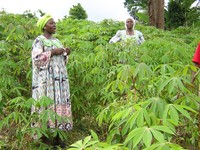 others around the world to act together for food justice and food sovereignty. It is a special time to raise awareness about farming approaches that help individuals and communities develop resiliency and combat poverty. We are called also to examine our food choices and to call for policy changes that will ensure the right to food for everyone.
others around the world to act together for food justice and food sovereignty. It is a special time to raise awareness about farming approaches that help individuals and communities develop resiliency and combat poverty. We are called also to examine our food choices and to call for policy changes that will ensure the right to food for everyone.
The global Week of Action includes World Food Day (Oct. 16) as well as the International Day of
Rural Women (Oct. 15) and the International Day for the Eradication of Poverty (Oct. 17).
In the PC(USA), “October is the month to raise awareness about hunger and poverty and God's sacred call to work for a world where everyone has sufficient, healthy and culturally appropriate food. This year’s theme is SOIL, so get the dirt on how you and your congregation can protect and love your neighbors throughout the entire food system.”
According to the Presbyterian Hunger Program:
Our faith calls us to work for a world where everyone has sufficient, healthy and culturally appropriate food! And those who produce and prepare the food are fairly compensated, respected and celebrated!
Through the Presbyterian Hunger Program, I invite you to co-missionally join with me responding to Jesus’ command to “feed them.”
September 2015
Cultural Humility
There is no longer Jew or Greek, there is no longer slave or free, there is no longer male and female; for all of you are one in Christ Jesus.—Galatians 3:28
I have a dream that my four little children will one day live in a nation where they will not be judged by the color of their skin but by the content of their character.—The Rev. Dr. Martin Luther King, Jr.
I have an image of both our denomination and the Church as a whole as being one big beautiful patchwork quilt, pieced together from all of our diversity of colors and patterns to form one unified body warming the world with the Good News of Jesus, the Christ.—The Rev. Marilyn Gamm
None of the above statements and dreams for humanity has yet been fully realized. Recognizing that I’m  reading and composing from the place of “white privilege,” perhaps the flaw of each—partial flaw—is an assumption that humans have the capability to become both color-blind and culturally blind. Indeed, in my younger years I thought that was the ideal, but I no longer think that is healthy for anyone.
reading and composing from the place of “white privilege,” perhaps the flaw of each—partial flaw—is an assumption that humans have the capability to become both color-blind and culturally blind. Indeed, in my younger years I thought that was the ideal, but I no longer think that is healthy for anyone.
Part of the beauty of racial and cultural diversity is difference, variety not only in skin color, but also in the lenses through which the world is seen and through which faith is interpreted.
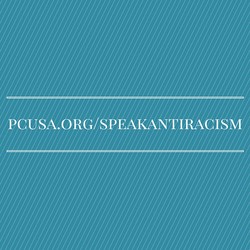 The #SpeakAntiracism campaign, launched during Big Tent in July, aims to recommit Presbyterians to racial justice and to the faithful proclamation that the lives of people of color matter. According to Racial Ethnic and Women’s Ministries Director Rhashell Hunter, “This campaign affirms that black lives matter. It will also create an awareness of institutional racism in our society and in the church. Our goal is to create an environment where racial-ethnic, new immigrant, and women Presbyterians may serve fully in ministry and leadership in congregations, mid councils, and other groups throughout the church. “
The #SpeakAntiracism campaign, launched during Big Tent in July, aims to recommit Presbyterians to racial justice and to the faithful proclamation that the lives of people of color matter. According to Racial Ethnic and Women’s Ministries Director Rhashell Hunter, “This campaign affirms that black lives matter. It will also create an awareness of institutional racism in our society and in the church. Our goal is to create an environment where racial-ethnic, new immigrant, and women Presbyterians may serve fully in ministry and leadership in congregations, mid councils, and other groups throughout the church. “
With Rhashell, I invite you to co-missionally join us in becoming a culturally humble community of believers, who have strength to love each other, engage in tough conversations, and deepen relationships across races and cultures in the PC(USA).
For more information on antiracism or cultural humility training, please contact the office of Gender and Racial Justice in Racial Ethnic & Women's Ministries at www.pcusa.org/racialjustice.
August 2015
Young Adults
Is not this the fast that I choose: to loose the bonds of injustice, to undo the thongs of the yoke, to let the oppressed go free, and to break every yoke? Is it not to share your bread with the hungry, and bring the homeless poor into your house; when you see the naked, to cover them, and not to hide yourself from your own kin? —Isaiah 58:6–7
Where are young adults in the Presbyterian Church (U.S.A.)? This is a question I hear asked frequently. It’s usually asked from a perspective of scarcity, of frustration, and even of fear. If there are no young adults sitting in the pews Sunday morning, then it’s presumed there will be no children, no next generations to keep and to carry on a congregation’s traditions, its ministry, its heritage.
The Presbyterian Mission Agency’s collegiate and young adult ministries recognize that this generation seeks to express its Christian faith differently. While there are still plenty of young adults who find value and meaning in Sunday morning worship and other traditional mainline practices, I have found that many others find more meaning in hands-on mission that includes building relationships with people they meet while serving.
Cameron Newell, a 20-year-old native of Scotland currently serving on the Ghost Ranch college staff, said in a recent Presbyterian News Service article that “the greatest thing about college staff is the genuine relationships you make here that are different from the ones back home. Because it’s an intentional community, you have conversations that you wouldn’t normally have. It’s a safe space to open up to each other.”
Where are young adults in the Presbyterian Church (U.S.A.)? Many are active in one of the more than 1,300 PC(USA) collegiate ministries, which are themselves enjoying a resurgence in interest and participation, in part through connections with the UKirk network. In July UKirk released its first worship resource, UWorship, which reminds us that “worship is a response to what God has done and a preparation ground for what God calls us to do throughout our whole lives.”
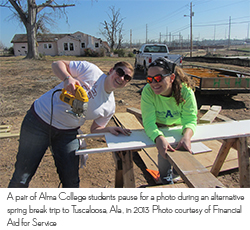 What’s Next What’s Now is another of our young adult ministry initiatives. The website offers links to worshiping communities and service opportunities as well as discussions about issues of special concern to young adults, such as hunger and poverty, justice and peace, and interfaith relations. These are reminders that young adults of this generation are indeed “doers of the word” (James 1:22).
What’s Next What’s Now is another of our young adult ministry initiatives. The website offers links to worshiping communities and service opportunities as well as discussions about issues of special concern to young adults, such as hunger and poverty, justice and peace, and interfaith relations. These are reminders that young adults of this generation are indeed “doers of the word” (James 1:22).
Rather than lamenting the absence of young adults in our traditional congregational settings, I invite you to co-missionally join with me in going out to where they are: asking faith questions in a troubled world, serving those in need in a hurting world, and building relationships with others and with Jesus Christ in every corner of a broken world God so loves.
July 2015
Coworkers in Mission
The gifts he gave were that some would be apostles, some prophets, some evangelists, some pastors and teachers, to equip the saints for the work of ministry, for building up the body of Christ, until all of us come to the unity of the faith and of the knowledge of the Son of God, to maturity, to the measure of the full stature of Christ. —Ephesians 4:11–13
Through our baptism into Christ’s church, we are all mission coworkers. All of us. God uses the full range of gifts of a diverse people to fulfill Christ’s mission at home and abroad.
This month I am celebrating two of the many ways God is sending coworkers in mission through Presbyterian Mission Agency ministries.
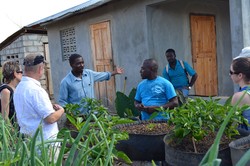 The first is the agency’s international mission coworkers. The deployment of international mission coworkers is one of the Presbyterian Church’s oldest ministries. Throughout our long history, women and men have embraced Christ’s calling to leave the comforts of home to go to unknown and often uncomfortable places to share God’s love with peoples who have not heard the good news. International mission coworkers sometimes experience hardship and danger as they embrace their calling to go and make disciples of Jesus Christ. Time and again, I am inspired by their stories of how God is using them. I encourage anyone who has an opportunity to host an itinerating mission coworker to do so. I also invite you to co-missionally join with me in financially supporting our 162 international mission coworkers at presbyterianmission.org/supportwm or by sending a check to the Presbyterian Mission Agency noted for E132192.
The first is the agency’s international mission coworkers. The deployment of international mission coworkers is one of the Presbyterian Church’s oldest ministries. Throughout our long history, women and men have embraced Christ’s calling to leave the comforts of home to go to unknown and often uncomfortable places to share God’s love with peoples who have not heard the good news. International mission coworkers sometimes experience hardship and danger as they embrace their calling to go and make disciples of Jesus Christ. Time and again, I am inspired by their stories of how God is using them. I encourage anyone who has an opportunity to host an itinerating mission coworker to do so. I also invite you to co-missionally join with me in financially supporting our 162 international mission coworkers at presbyterianmission.org/supportwm or by sending a check to the Presbyterian Mission Agency noted for E132192.
The second is the 1001 New Worshiping Communities initiative. Although this ministry is one of the agency’s youngest, it continues a long-standing Presbyterian tradition of embracing a call to leave the comforts of an established congregation in order to share God’s love with people across town or around the country who have yet to hear the good news. These domestic coworkers in mission also may experience hardship and danger as they answer the call to go into new and different communities to make disciples of Jesus Christ. I personally have found the 1001 initiative to be a fresh breeze of the Holy Spirit in our church. As of early June, there were 279 verified new worshiping communities in 113 presbyteries. I encourage you to check out videos about some of them at onethousandone.org, to visit one near you, to invite these coworkers in mission to share their stories with you, and to co-missionally join with me in prayerfully supporting their service.
June 2015
Active Life
Do you not know that your body is a temple of the Holy Spirit within you, which you have from God, and that you are not your own? For you were bought with a price; therefore glorify God in your body.
–1 Corinthians 6:19–20
There’s a new observance in this year’s Presbyterian Planning Calendar—Active Life Week, beginning Sunday, June 28. It’s described this way: “Celebrate God’s gift of life by including physical activity in worship, doing active community outreach, and promoting Active Life Week.” More information and worship services are available at activelifechurch.org.
Who among us doesn’t think “I need to be more physically active”—or hasn’t been strongly urged toward more activity by a doctor? Never mind the teachings throughout Scripture about wisely stewarding our physical bodies as well as our souls. Since I’ve fallen off and gotten back on the “more physically active” wagon too many times to count, I’ll admit I was curious to learn more, and I hope you will be too.
 When you visit the website you learn that Active Life is in partnership with Team Sweaty Sheep [pictured], a new worshiping community whose motto is “Re-creation through Recreation.”
When you visit the website you learn that Active Life is in partnership with Team Sweaty Sheep [pictured], a new worshiping community whose motto is “Re-creation through Recreation.”
The Active Life movement offers resources “to help your church to become more physically active, to reach out to your community, and to glorify God more fully by honoring your God-given bodies.” Through following five core Active Life practices—healthy living, play, inclusivity, community involvement, and active faith—your congregation can “bring new life to your whole community and build a relationship with God that includes both body and soul.”
I invite you to co-missionally join me not only by observing Active Life Week as individuals and worshiping communities but also by making an active lifestyle an integral part of your everyday spiritual life.
May 2015
Ambassadors
So we are ambassadors for Christ. —2 Corinthians 5:20a
Did you know you can invite any of our Presbyterian Mission Agency program staff to present to your synod, presbytery, Presbyterian Women, Presbyterian Men, and church gatherings? Our dedicated staff love to talk about the wonderful ways God is at work through their ministry areas. Your group is invited, as you are able, to co-missionally share their travel costs. I promise you it would be money well spent!
Did you know you also can invite any of our Presbyterian Mission Agency Board members to present to your 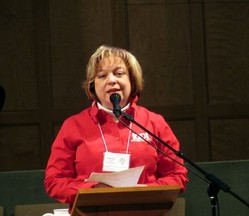 synod, presbytery, and church gatherings? Part of our calling as board members is to serve as ambassadors of the Presbyterian Mission Agency to the larger church. As board members, we hear and interact with all kinds of staff and reports detailing how the agency is inspiring, equipping, and connecting the church to serve Christ in the world. We want to share what we know with you and co-missionally connect you to the agency’s staff and resources. Please invite us to set up displays and to speak about the wonderful ministries of the Presbyterian Mission Agency during your synod, presbytery, Presbyterian Women, Presbyterian Men, and other such gatherings. You can invite us also to provide minutes for mission during worship or to present programs as part of your congregational gatherings. We are happy to speak broadly about the agency’s work, or more specifically about a particular ministry. Board members in your area can be found in this directory.
synod, presbytery, and church gatherings? Part of our calling as board members is to serve as ambassadors of the Presbyterian Mission Agency to the larger church. As board members, we hear and interact with all kinds of staff and reports detailing how the agency is inspiring, equipping, and connecting the church to serve Christ in the world. We want to share what we know with you and co-missionally connect you to the agency’s staff and resources. Please invite us to set up displays and to speak about the wonderful ministries of the Presbyterian Mission Agency during your synod, presbytery, Presbyterian Women, Presbyterian Men, and other such gatherings. You can invite us also to provide minutes for mission during worship or to present programs as part of your congregational gatherings. We are happy to speak broadly about the agency’s work, or more specifically about a particular ministry. Board members in your area can be found in this directory.
When we come to share about the Presbyterian Mission Agency, we would love for you to tell us how God is at work in your communities and through your ministries, which will co-missionally inspire and equip us to serve Christ in the world in new and creative ways.
To God be the glory!
April 2015
Resurrection
But the angel said to the women, “Do not be afraid; I know that you are looking for Jesus who was crucified. He is not here; for he has been raised, as he said.” —Matthew 28:5–6
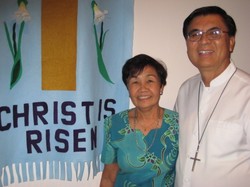 Resurrection, new life, hope restored, possibility unleashed: these are but a few of the thoughts the Easter story brings to mind. If Jesus has been raised, as he said, then the possibility that all can be raised is unleashed on the world. If Jesus has been raised, as he said, then the possibility that new life can come to dead hopes, dead programs, dead lives is unleashed on the world. If Jesus has been raised, as he said, then possibility itself is unleashed in the world.
Resurrection, new life, hope restored, possibility unleashed: these are but a few of the thoughts the Easter story brings to mind. If Jesus has been raised, as he said, then the possibility that all can be raised is unleashed on the world. If Jesus has been raised, as he said, then the possibility that new life can come to dead hopes, dead programs, dead lives is unleashed on the world. If Jesus has been raised, as he said, then possibility itself is unleashed in the world.
Jesus has been raised, as he said. This is the ultimate claim of our Christian faith: the power of the resurrection, the power of resurrection hope.
One Great Hour of Sharing is an opportunity to co-missionally participate in resurrection possibility. Three programs benefit from One Great Hour of Sharing: Presbyterian Disaster Assistance, the Presbyterian Hunger Program, and Self-Development of People.
Presbyterian Disaster Assistance is our boots on the ground—the hands and feet that bring and restore hope to people who have suffered natural and human-caused disasters such as earthquakes, tornadoes, hurricanes, flooding, snow storms, mass shootings, and other tragedies.
The Presbyterian Hunger Program works with congregations and global partners to bring and restore hope through alleviating hunger and working to eliminate its causes.
Self-Development of People brings and restores hope by empowering people who are economically poor, oppressed, and disadvantaged. Resurrection comes through supporting projects that are owned and controlled by the groups of people who directly benefit.
One Great Hour of Sharing: Sharing Resources and Changing Lives
March 2015
Women
“for your daughter-in-law who loves you, who is more to you than seven sons”—Ruth 4:15
I was a teenager when my grandmother took me aside one day and said to me something along the lines of, “Honey, Grandma is getting too old to kill chickens anymore, and you know your mother can’t do it. [My mother is terrified of live chickens.] So you have to learn how to do it.” It was a passing of the mantle, and as much as I hate to kill and hate the smell of blood, I knew Grandma was right. I had to accept the mantle she was passing to me—this means of helping to provide food for my family—and learn how to kill chickens.
 Named women are few and far between in the Bible, and therefore all the more noteworthy. Ruth and Naomi are two such women. Ruth, a Moabite, was the daughter-in-law of Naomi, who was from Bethlehem. When Ruth’s husband (and Naomi’s son) died, this daughter-in-law made a conscious, loving decision to return with Naomi to Judah, to stand by her mother-in-law and ultimately become her means of support.
Named women are few and far between in the Bible, and therefore all the more noteworthy. Ruth and Naomi are two such women. Ruth, a Moabite, was the daughter-in-law of Naomi, who was from Bethlehem. When Ruth’s husband (and Naomi’s son) died, this daughter-in-law made a conscious, loving decision to return with Naomi to Judah, to stand by her mother-in-law and ultimately become her means of support.
Let’s be clear: Ruth did not have to “cling to” Naomi. She could have remained in Moab and remarried, leaving her mother-in-law to fend for herself. Indeed, it’s what Naomi expected and encouraged, even though, with no sons to provide for her, it would have left Naomi utterly destitute. But Ruth chose to stay with, honor, and support Naomi. Though neither could have known how God would ultimately use their mutual love, honor, and respect, through Ruth’s loyalty to Naomi she became King David’s grandmother and is included in Jesus’ lineage.
This month—Women’s History Month—I encourage Presbyterian congregations to co-missionally remember Ruth and Naomi and the bond between young and senior women as part of Celebrate the Gifts of Women Sunday on March 8, which this year also happens to be International Women’s Day. In countries such as China, Russia, Vietnam, and Bulgaria, International Women’s Day is actually a national holiday!
February 2015
Love
“I give you a new commandment, that you love one another. Just as I have loved you, you also should love one another. By this everyone will know that you are my disciples, if you have love for one another.”
—John 13:34–35
The calendar has just turned to a month when, as the old disco hit puts it, “love is in the air.”
We will shower our beloved with tokens of affection on Valentine’s Day and, just a few days later on Ash Wednesday, begin our Lenten journey together toward Easter—God’s ultimate expression of love for the world.
The particular love I’m inviting you to share in with me this month, though, is love for sisters and brothers living with depression or other mental illness. The poignant reminder below is adapted from a Presbyterian Health Network resource designed to help the whole church observe Health Awareness and Prayer for Healing Sunday, which falls this year on February 15.
Who is in need of God’s redeeming love?
The person whose mind cannot function normally,
or the person whose mind is closed and refuses to seek the wisdom of God?
The person who talks to “make believe” people,
or the person who cannot permit himself to have an imagination?
The person who is alone and crying for someone to come and visit her,
or the person who refuses to give her neighbor a helping hand?
The person who cannot get help on his own,
or the person who believes that he has to take care of himself?
The person who has depression and cannot get out of the bed in the morning,
or the person who is so busy that she does not have much time for sleep?
 The person who attempts death by suicide,
The person who attempts death by suicide,
or the person who ignores talk about suicide?
The person who is anxious and cannot make a decision,
or the person who makes a decision that is harmful to others?
The truth of the matter is we are all in need of God’s redeeming love. Let’s remember that.
January 2015
A New Year
I am about to do a new thing; now it springs forth, do you not perceive it? I will make a way in the wilderness and rivers in the desert. —Isaiah 43:19
Happy New Year! Yes, I know our Christian new year began the first Sunday of Advent, but culturally we have also now begun a new year. With the beginning of 2015 we are already 15 years into a new millennium! I can still remember Prince singing encouragement for us to “party like it’s 1999,” along with the Y2K concerns about disaster as our calendars changed to the year 2000. And now it’s already 2015!
I love the beginning of a new year.
It’s partly because my spouse and I got engaged on New Year’s Eve 11 years ago as the clock struck midnight and a new year began.
A new year signals opportunities to start fresh, which is why so many of us make New Year’s resolutions.
As Christians, we serve a God who’s all about new beginnings, fresh starts. That’s part of why God sent Jesus to be born, to minister in the world, to die for the sins of the world, and to be resurrected into new and glorious life.
We who serve through the Presbyterian Mission Agency and its Board of Directors are in the process of making a fresh start with regard to the 1001 New Worshiping Communities initiative. We are taking steps to increase confidence that this disciple-making initiative is all that we believe God has inspired it to be for the Presbyterian Church (U.S.A.).
I continue to be inspired and encouraged by the 1001 vision. God is doing a new thing in the PC(USA). Won’t you co-missionally join with me in inspiring, engaging with, supporting, and encouraging those called through this initiative to “make a way in the wilderness and rivers in the desert”?
December 2014
Christmas
The wolf shall live with the lamb, the leopard shall lie down with the kid, the calf and the lion and the fatling together, and a little child shall lead them. Isaiah 11:6
This is my favorite Scripture from the Advent/Christmas season. Yes, of course, I love Luke 2:1-20, too. We cannot truly have Christmas without the story of Jesus’ birth.
Jesus was born into a world of poverty, a world of political, religious and racial/ethnic tyranny and oppression. In varying ways, depending on our life circumstances, we have seen and experienced a degree of the world where Christ lived.
Isaiah 11:6 envisions a different kind of world, a world in which predators and prey live together in peace and harmony — fantastic enough to try to imagine — with a little child serving as their leader. It is a hopeful, hope-filled image for the Israelites facing conquer and exile by a foreign power. It is a hopeful, hope-filled image for Jesus and his contemporaries living under cruel Roman rule. And it is a hopeful, hope-filled image for us, today, living in a world of terrorist threats.
As faithful people have down through the ages, I need this kind of image — fantastic though it seems — to give me hope, courage, and encouragement for the days and times in which we are living and serving.
As we receive gifts of hope, courage, and encouragement from Scripture during this Advent/Christmas season, I invite you to co-missionally join me in opportunities to offer gifts of hope, courage, and encouragement.
The Christmas Joy Offering provides funding to the the Assistance Program of the Board of Pensions and for Racial Ethnic Leadership Development.
The Presbyterian Giving Catalog is another opportunity to co-missionally participate in opportunities to offer hope, courage, and encouragement.
Together, we can not only envision, but participate in a different kind of world.
November 2014
Worship
O come, let us worship and bow down, let us kneel before the LORD, our Maker! For he is our God, and we are the people of his pasture, and the sheep of his hand. Psalm 95:6-7
Through Scripture, the psalmist continues to call people of faith to humbly worship our Creator. Although the forms and expressions and venues for worship have been and continue to be many and varied as Jesus’ disciples have spread his teachings around the globe, the One we worship remains eternal.
John E. Burkhart writes in Worship: A Searching Examination of the Liturgical Experience, “Worship is the celebrative response to what God has done, is doing, and promises to do.” In worship we encounter the Triune God, who invites us into transformation and to see the world through divine eyes. Worship motivates us to serve: serve God, one another, our community, and the world.
The 221st General Assembly (2014) called the denomination to consider a proposed revision to the Directory for Worship—the middle section of the Book of Order. A draft of this revision has been commended to the church for a one-year “season of study”—July 1, 2014-July 1, 2015—with an invitation to comment upon it. Comments will be reviewed and considered for incorporation into a further revision, expected to go to the 222nd General Assembly for inclusion in the Book of Order, pending subsequent approval by the presbyteries.
A recent 30-minute webinar on this proposal—“Revising the Directory for Worship: Bread, Bath, and Beyond,” now available on the Directory for Worship website—was recorded and is free for congregational and individual study as well.
All across the PC(USA)—in congregations, mid councils, seminaries, and beyond—not only is the proposed revision generating positive reviews, but it is being put to practical use. One mid council leader reports that he is already using the draft to talk to pastors about worship and finds the revision clearer and easier to use. Seminary professors say they look forward to using it to teach about worship and help students prepare for ordination exams. Leaders from another Reformed denomination have praised the document as an excellent account of our common tradition.
I invite you to take the time to “co-missionally” engage this Directory for Worship revision process with questions, thoughts, and suggestions. In this way, worship can truly be the work of the people of God.
October 2014
Domestic Violence
Domestic violence. “Domestic” as in “home” and “family” life. “Violence” as in abusive, controlling behaviors and words from a position of power toward another, which may be physical, psychological, or spiritual, or some combination of any or all of these.
Domestic violence. Two terms in God’s created good world that should never go together. But in too many homes across the United States and around the globe domestic violence imprisons people in a life of silent fear, pain, and despair, and often leads to violent death.
The overwhelming majority of victims of domestic violence are women and children. Domestic violence occurs in the homes of rich and poor alike. It occurs in every racial/ethnic group. Domestic violence can happen to anyone.
October is Domestic Violence Awareness Month, which this year coincides with the 20th anniversary of the Violence Against Women Act.
This is a time to talk openly about this crime against humanity in worship and other venues, raising awareness and making resources available. The Presbyterians Against Domestic Violence Network (PADVN) resource is downloadable here.
This 2014 resource includes the launch of, “an exciting new resource written by PADVN Moderator, the Rev. Dr. Kevin E. Frederick, Men in the Mirror: Constructing and Applying a Christ-centered Masculinity to Interpersonal Relationships, a new 13-session curriculum for use in addressing violence against women and children.” In it, Dr. Frederick writes that, “By studying the dynamics exhibited in Jesus’ relationships with a variety of others in his lifetime, this new [study] sets out to explore and address the values that impact men’s relationships giving them the opportunity to critique their own relationship skills and grow in their discipleship to Jesus Christ.”
I invite you to co-mission with PADVN in using “these resources in the month of October and throughout the year, working to Break The Silence around domestic violence.”
September 2014
Peacemaking
Every day as I read and hear news reports from as far away as Israel and Iraq and Ukraine to as close as Ferguson, Missouri, my heart breaks for peoples and communities for whom a peaceful life is, at best, only a dream. And I wonder what can I do? How can I make any difference in such complicated, conflicted situations?
There are no easy answers.
But there are some things that I—that we—can do. We can all pray. Pray for those in harm’s way. Pray for families who have lost loved ones to war and violence. Pray for those trying to mediate peaceful solutions. Pray for leaders to be open to a mediated peace.
We can also co-mission with the Presbyterian Mission Agency in its peacemaking endeavors. One of those is the new Peace and Global Witness Offering, formerly the Peacemaking Offering, which congregations are encouraged to receive in September and October. This offering funds the Presbyterian Peacemaking Program, enabling us to bring in International Peacemakers, hold conferences, and advocate for active nonviolent solutions to conflict.
In his introduction in the Leader’s Guide for this year’s Peace and Global Witness Offering, Carl Horton of the Presbyterian Peacemaking Program states:
“The Presbyterian Church (U.S.A.) views peace as a core part of our identity and calling as believers. It is a central declaration of the gospel, calling us to model our lives in the pattern of the Prince of Peace, Jesus Christ. This year, we invite you to take part in A Season of Peace, September 7 – October 5. This four-week pilgrimage is designed to deepen the pursuit of peace for congregations, small groups, families, and individuals.”
Carl concludes, “Together, we can transform cultures of violence into communities of peace.”

August 2014
Education
Presbyterians have long valued education, particularly quality public education. For this reason, the Presbyterian Mission Agency—through its World Mission and its Compassion, Peace, and Justice ministry areas—has just launched a new “co-mission” initiative called “Educate a Child, Transform the World.” Our goal is to help 1 million children move out of poverty through strategic worldwide education endeavors over the next six years.
We are inviting you to help us discern where and how we can have the greatest collective impact. World Mission director Hunter Farrell is suggesting that local church leaders gather concerned persons together to consider this question: “What would it take to provide quality education where we are?”
When I was a pastor in Madison, Wisconsin, a community organizer guided community leaders from all sectors in just this kind of conversation. The result was culturally relevant teacher training throughout Madison public schools.
As our young people prepare to head back to school, I want to lift up some of the ways the Presbyterian Mission Agency serves in co-mission with the church to support and resource quality education. Here are few practical suggestions to help you get started:
Taking action through prayer
- A Litany for Education and Schools
- Pray for schools.
Taking action through service
- Read more about programs that provide children and youth with mentoring and safe after-school and summer programs.
- Explore ways to get involved in your public schools.
- Sign up to receive updates from the PC(USA) office of Child Advocacy to learn about additional ways you can take action.
Taking action through public witness
- Talk with candidates for public office.
- Receive updates on legislation related to education.

